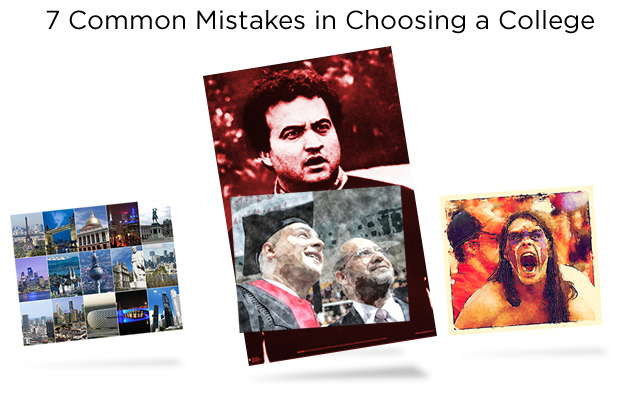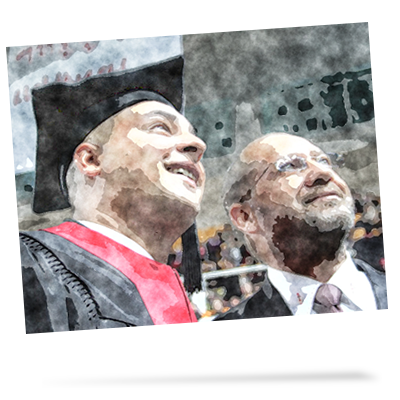
There are a number of common mistakes that students and parents make when thinking seriously about researching colleges and universities or conservatories after attending their performing arts high school. The volunteer advisory has run into many of them over the years. Here’s our “greatest hits” of pitfalls to avoid when considering where you might go next on your educational journey:
 1. My [INSERT PARENT, GRANDPARENT, or OLDER FAMILY MEMBER OR FRIEND HERE] went there.
1. My [INSERT PARENT, GRANDPARENT, or OLDER FAMILY MEMBER OR FRIEND HERE] went there.
Unless you know someone who attended a school within the last eight years, it will have changed a lot since the days of your parents or grandparents. Most larger universities continue to grow in student population, which does have a profound affect on the experience, because the resources of campus are still about the same size. Your father’s engineering department may have had 200 people. Today it might be 1,800 or more. The campuses change all of the time too. That nostalgic little coffee house where grandma used to sing Janis Joplin tunes may be a chemistry building or a parking lot today.
If you have an alumni connection, it can help you at some schools, although less and less each year. If your parents have been good donors to the school, or your neighbor or family friend has, and has some pull, it can help. Just realize that you still need to see the school in its current condition, and see if the program(s) that interest you are of a size and have a faculty that will position you well for graduate school and/or life.
 2. I’m an [INSERT MASCOT HERE] FAN!!!
2. I’m an [INSERT MASCOT HERE] FAN!!!
You may have grown up with family or friends rooting for a particular school’s sports team(s). Sports on campus can be a very important part of student life for people, but don’t choose a college in size or in programs for this as a FIRST or second choice. There is this miracle known as television. You can still be a Gator fan, for example, and go to Lewis & Clark College. No one will take away your foam #1 finger.
3. To Be Safe We Want to Dual Major [INSERT PRE-MED, LAW, BUSINESS HERE] and Music Performance
Students attend a performing arts high school for a reason: Most of you are HUGELY talented, and many of you put the work into your art to achieve at the highest levels throughout your lives. Parents kind of know this, but, particularly if they never were in the arts, can have a lot of sleepless nights with visions of you selling pencils out of a tin cup in front of Carnegie Hall.
Even if you have a 4.9+ GPA, are involved in fifteen clubs, play six instruments at concert level and help little old ladies across the street, think LONG and HARD before even considering Dual Enrollment. College, and even some conservatories, offer it as a “hook” but they are SELDOM handed out and many who do actually get the slots regret it, as do their parents.
Expect that Dual Major with music and something else is a five to six year commitment of your time and your parents’ money. Most people who do it are very burnt out, so toss in a possible added year off before moving on to your career of choice. Even assuming that you can study in your sleep and play at a high level, the chances are better that you will do two things to a mediocre level rather than one thing to the level to which you are accustomed, which will tend to only cause you to question both paths more, and you may have greater difficulty in really heading off in one on a good footing.
An alternative solution to the tin cup nightmare: Music is one of those things that can only be launched into well when you’re young. Not too many budding violin virtuosos who begin in their 30’s to 50’s.
Here is where anxious parents have to trust that there is balance and harmony in the universe: Doors open, and doors close. Usually most students leaving a performing arts high school who go into music go into a “shakedown cruise” with their love of it. The first year is the tell. If this is for you, and you are in a good place, top chair or on the track to same, and opportunities are opening up, and you are eating it up with a fork, then keep going until the doors start closing. You don’t get a promotion that you’re looking for. You’re struggling with literature OR, what happens most often: You stop seeing yourself doing something in music for the rest of your life.
At that point, you are not a Big “M” musician. Change majors. Or change schools. The difference in units needed might cost you an extra semester or a summer, but then you will KNOW if music is your calling or not.
The only time that Dual Degree generally works is if someone is doing something like pre-med and music therapy, or education and music education, where the elements are complimentary and some of the prerequisites are common enough that it can keep you from becoming a DD zombie.
 4. I’ve always wanted to live in [INSERT CITY HERE]!
4. I’ve always wanted to live in [INSERT CITY HERE]!
Quality of life is a HUGE thing about picking a school, to be sure, as you have to live someplace for four years, but just because you have always fancied living in Los Angeles, or New York, doesn’t mean that it is necessarily the best place for your area of study, or that the school.
Don’t cut out schools that often have great campus social life, even if the town is a one-cow town without the cow (Think Gainesville, Florida or Oberlin, Ohio).
If you are a serious music performance student, you SHOULD be looking at schools that give you an opportunity to perform out in the real world, for real money. Cities like New York and Los Angeles are kind of self-evident, but cities like Orlando or Las Vegas, big entertainment hubs with a ton of wedding business, may provide the additional real-world experience you need.
Don’t rule out cities outside of the United States either. Your skillsets are the kind that transport globally, and your opportunities to perform might be better in Europe or Canada, for example, and the world that you are entering into is a much bigger, more networked place than it was when your parents were considering where to study. It’s often cheaper to study in places like Canada, or you’ll get more scholarship money to go to Ireland or Belgium. There are schools in some countries that offer a FREE education, with classes taught in English, just to attract internationally diverse students.
Other factors to look at when looking at the cities:
- What are their travel expenses? Use Kayak to find out what a ticket costs at Thanksgiving, Christmas, Spring Break. If it’s high near a school that you love, are there alternative airports, or a bus/airport combo that help keep the costs in line.
- What is the cost of housing and food?
- Is there good mass transit, or is it small enough to be a walking town, or do I need a car?
- Are there any language or cultural issues?
- Does the exchange rate help or hurt the cost of my education?
- Does the place have something about it that helps me achieve my goals? If you were into politics, for example, you might look at a school within range of Washington D.C. or a state capital as a good opportunity. Marine biology? Probably Arizona State isn’t your school.
 6. We come from [Insert Life Story Here] and our child MUST go to [Insert School Here].
6. We come from [Insert Life Story Here] and our child MUST go to [Insert School Here].
For so many families, the romantic ideal of what a quality education is all about becomes focused on a particular place. My [child] is going to [Harvard/ Princeton/ Yale/ Stanford] etc.
Sometimes it’s the school that mom or dad WISH they’d gone to. “You know, I should have gone to Michigan and not Michigan State.”
The A-List School Problem: While it is certainly an accomplishment to go to an Ivy League school, and a status thing, is undergraduate the right timing? Some schools, like Brown, Dartmouth, Stanford, Vanderbilt, and Princeton, are really great, supportive places for undergraduates, with amazing faculty who do actually interact with them. Others, like Harvard, Penn, Yale, Georgetown, Columbia/Barnard, maybe a bit less so. The same holds true with music conservatories.
Conservatories like Juilliard have an internal system that could, at best, be called “austere,” and require an intense amount of self-discipline, dedication, and daily preparation, where music schools like Eastman or Oberlin Conservatory might be a touch larger, but are inclusive and nurturing and give a musician a more solid footing to apply to the Juilliards and NECs and/or just get ready for life as a professional musician.
Most professors at the “top” universities publish, hit the talk show circuit, or do seminars and other engagements around the world.
Years ago, noted economist Milton Friedman taught an undergrad econ course, where he walked in and said: “I’m working on a book. They’re making me teach this course, and I don’t have time for you. See one of my assistants in office hours if you have questions.” Schools’ admission offices love to tell you that this NEVER happens at their schools, but it still does.
There are a lot of students who are pushed into top schools by their families that don’t find the level of success there that they would like. If you fit well into different social cliques then you might do just fine. If you’re a bit more isolated, anti-social, etc. it might be a complete fail for you, because networking is the name of the game at these places.
Many students will know each other, as some high schools, almost always private, form the “core class,” the go-to recruiting high schools that the Ivy schools can rely on to produce top students and bring in students who are socially and politically connected to powerful, wealthy families in various parts of the country: Phillips Academy (Andover/Exeter), Horace Mann, Choate, Harvard-Westlake, Ransom Everglades, Pinecrest, etc.). By the time you get to graduate school, none of that matters. In undergrad, though, it can be a consideration as to “fit” for you.
“Nameplate” schools are really best for graduate school, or a “terminal” degree like a Ph.D., JD. (Law) or MD. You want to go out into the world with the alumni networking power and the connectivity to peers at the graduate level, because that will give you the most “bang for your buck.” Some schools at the graduate level also need teaching assistants.
A partial or full-ride for graduate school through a teaching position at an A-List school might be had if you went to a school like one of the mini-ivies (Haverford, Bates, Bowdoin, Reed, etc.) where you have a small class size and a lot of one-on-one with professors, you write a thesis to graduate, and that thesis can be used to “shop” a better position for yourself at one of your field of study’s top graduate schools. Your faculty at one of those schools probably will even help, because you landing in a good position is a “win” for them as educators, and a feather in the cap for the school’s future recruiting.
That’s not to say that you shouldn’t GO if you are admitted, you visit, and you feel that the department’s faculty is going to get you to where you want to be in four years for graduate school.
Last, on the dream schools (for you or your parents) warnings: Remember that very few schools re-admit their undergrads as graduate students. It’s about change for the school and you getting new experiences that broaden your thinking in your field of study. So if you go to Harvard, will you do your graduate work at Cornell? At Stanford? Always good to have an idea of what pathways students graduating these schools take to their higher degrees. If a ton of graduating seniors from, say, Columbia’s English department all end up at film schools on the West Coast like AFI or USC, and you want to do film, then being there is a good thing. If Harvard has the best nuclear medicine program in the country, and that’s ultimately what you might want to do, do you really want to go to undergrad there with the possibility that you won’t be able to do the program you really want there after four years?
7. My [INSERT CHILD GENDER HERE], the [INSERT HIGH EARNING PROFESSION HERE]!
Most parents want their kids to do well in life. For some, your success is an extension of their success in raising you. Often there is some pressure to commit to a very specific pathway. So, just maybe, they push (Just a little bit!) for you to consider a career in something that doesn’t exactly light up your world. Or, perhaps, you come from a long line of doctors, lawyers, shoemakers, etc., and there is some desire for you to follow in the family footsteps. Or, perhaps, you are the first person in your family to go to college, and your parents want for you all of the things that they would have liked to have been able to do themselves, or do for you.
If you are an applied person, a smart person, you enjoy challenges, and rise to them, you will do well in whatever your passion is, no matter where you are.
So turn this over to your parents for a second.
Parents:
There are so many pathways to a successful life now. So many more than were available to your parents. Careers in computer science were just rolling out when many of you went to school. Internet marketing. Nanotechnology. Green energy.
Undergraduate is about two things: :”Who am I going to be when I grow up?” and “What do I want to generally do when I graduate?” College is filled with possibilities. Help your student narrow down basic directions. I’m interested in the sciences. I’m interested in engineering. I’m a musician.
There are so many avenues out there right now that neither you nor they know what will be that “thing” that excites them about getting up every morning, what challenge might push the boundaries of some bit of knowledge, build something great, make important decisions, heal the sick, bring someone comfort, or change the way we look at things. The big picture is where will they be not just in the next four years, but in 8, or 10 or 12, and then in life. Keep goals long range, and specifics a bit fuzzy unless you have the “focused” student.
Some students wake up in the morning when they’re 11, 12, 13 and know they’re going to be a violinist, an astronaut, a lawyer, or a doctor. For the other 93% though, the best thing you can do is put them in the hands of educators who see them as PEOPLE, not nine digit numbers. Where can they work with professors, work on research projects or business projects as undergrads, get the most out of their education rather than just a diploma with 13,000 other students that year. One thing about a performing arts high school’s students is that they are UNIQUE. Help them express that!
